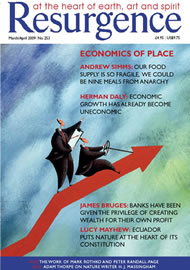MONEY IS STRANGE. To you and me it is real; we know what we have or have not got in the bank. But it soon becomes unreal. The government can’t find £150 million for rural post offices – a very desirable social service – but can immediately come up with £37,000 million for the banks, with another £450 billion available: where does it come from? Companies on the stock exchange suddenly lose billions: where has it gone?
To understand why money can be real and unreal at the same time, imagine a very simplified incident: you sit down with a bank manager and after an hour you are able to spend £200,000 on a house. Good. But you are also lumbered with debt – negative money.
First scenario: overnight you decide not to go ahead with the purchase. The mortgage is cancelled. The £200,000 was conjured out of nothing one day and ceased to exist the next, so it can be described as pseudo-money.
Second scenario: you buy the house. The previous owner uses the money to buy things, employ a gardener, go to the theatre, travel. The £200,000 is now being used to buy and sell goods and services. That act of creating debt – negative money – is how the economy keeps ticking over.
Now fast-forward fifteen years. You have worked hard and paid off your mortgage. The original £200,000 debt, pseudo-money, is paid back and, as in the first scenario, no longer exists. But you have also paid interest over the years that maybe amounts to another £150,000. This growth is endemic to a financial system based on interest.
The beneficiaries, however, are not satisfied with linear growth. Deregulation has allowed them to multiply the growth of their money many times through ‘vehicles’ that no-one seems to fully understand. Herman Daly, a leading ecological economist, says that money transactions now outstrip transactions of real things by 20 to 1: the present so-called liquidity crisis is due to too many financial assets relative to real-world assets.
Hyper-intelligent financiers have been blinded by their greed to one little problem: debt must be settled. Financial assets of negative money – as created by the bank in the above incident – have to be paid back by real assets, real work and real people. There are not enough real assets to pay off the superabundance of debt the financiers have created. The collapse is not due to a shortage of money but to the overabundance of pseudo-money.Frederick Soddy, a scientist, said in the 1920s, “You cannot permanently pit an absurd human convention such as spontaneous increment of debt (compound interest) against the natural law of the spontaneous decrement of wealth (entropy).”
BUT WHY SHOULD banks be given this incredible privilege of creating the nation’s money for their own profit? US presidents saw the dangers for their new country. Jefferson: “The issuing power should be taken from the banks.” Madison: they “have used every form of abuse, intrigue, deceit, and violent means possible to maintain their control over governments by controlling money and its issuance”. Lincoln: “The Government should create, issue, and circulate all the currency and credits needed to satisfy the spending power of the Government and the buying power of consumers. Money will cease to be master and become the servant of humanity.”
Woodrow Wilson signed the 1913 Federal Reserve Act. A few years later he wrote: “I have unwittingly ruined my country … we have come to be a Government by the opinion and duress of a small group of dominant men.”
The threat of this small group that has divorced itself from the real economy – witness the absurd bonuses they award themselves – has now become obvious to all. But all are paying the price.
The privilege should be taken away from banks. Banks should be financial intermediaries that lend depositors’ money. It should be a criminal act for anyone other than the state to issue the nation’s money. All the money needed for exchange should be issued free of interest by an independent body answerable to parliament and should be spent into circulation by the government. We would then have an economy that is not dependent on usustainable growth.
The sudden collapse of a system that has been created by humans – which should therefore be manageable – acts as a warning that over-exploitation of far more complex natural systems could lead to an equally sudden ecological collapse. •







